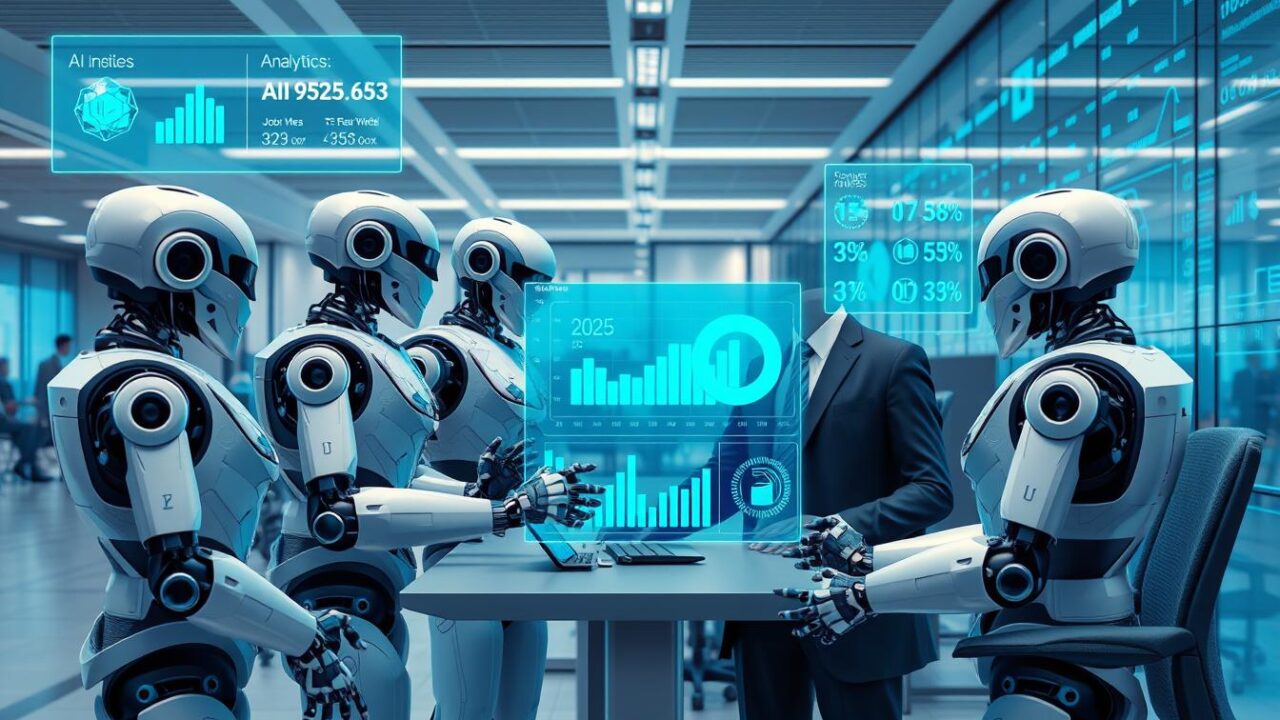This article explores how AI influences job roles, business operations across different organizational sizes, and key sectors like cybersecurity, software development, and telecommunications. Understanding AI’s role in this shifting landscape is no longer optional—it’s essential for staying competitive in an increasingly dynamic job market.
The Global Workforce Landscape in 2025
The global labor force in 2025 comprises 4.3 billion individuals, with 1.7 billion in traditional employment and 2.4 billion self-employed or working in the informal sector. This diverse workforce operates across a spectrum of business sizes, each experiencing AI’s impact differently.
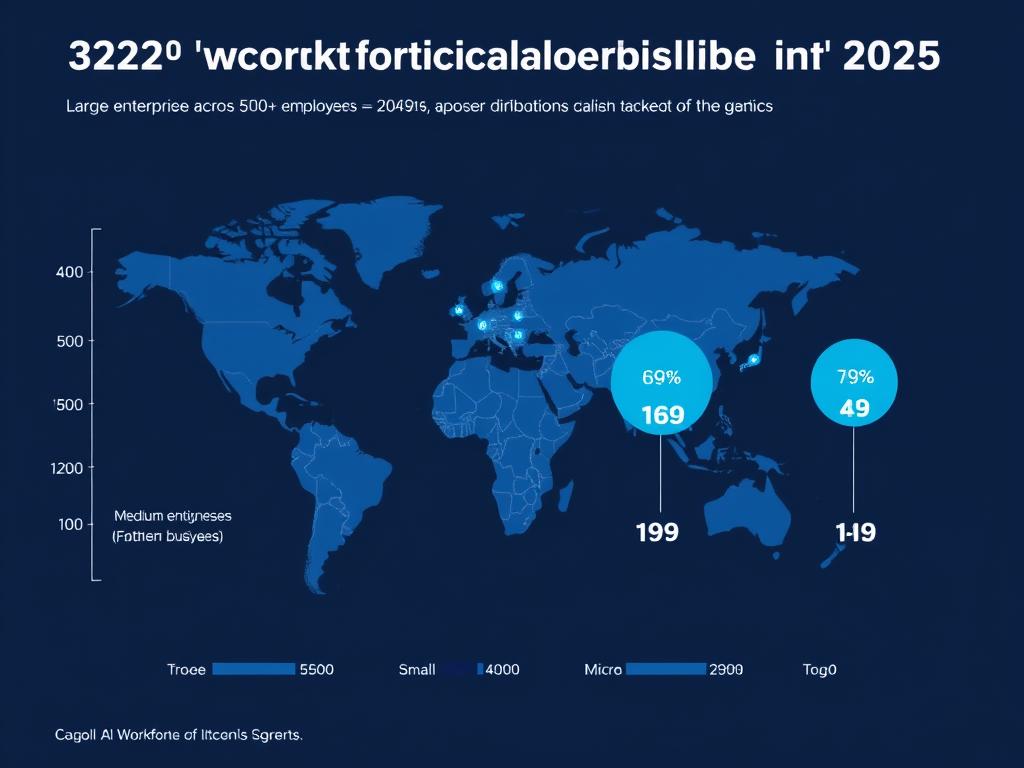
Business Size Breakdown and AI Adoption
| Business Size | Number of Businesses | Total Workers | Average Workers | AI Adoption Level |
| Large enterprises (500+) | 215,654 | 623 million | 2,890 | High (81% of AI buildout) |
| Medium businesses (100-499) | 1.3 million | 261 million | 208 | Medium-High |
| Small businesses (10-99) | 17 million | 409 million | 24 | Medium |
| Micro businesses (1-9) | 123 million | 362 million | 3 | Low-Medium |
The data reveals that 141.1 million businesses employ an average of 12 people, highlighting the remarkable diversity in organizational scale across the global economy. This diversity directly influences how AI technologies are implemented and their impact on workers.
Automation and AI tools are reshaping tasks across all business sizes, with large enterprises leading the charge—accounting for 81% of global AI buildout. This creates both challenges and opportunities for workers who must adapt to AI-driven changes to remain relevant in tomorrow’s job market.
Navigate AI’s Impact on Your Workforce
Discover how AI will transform your specific business operations and workforce needs in 2025 and beyond.
AI’s Dominance in Large Enterprises and Government
Large enterprises and government entities are driving 81% of AI development in 2025, creating a significant impact on the job landscape. These organisations have the resources and scale to implement comprehensive AI strategies that transform entire industries.

How AI is Transforming Jobs in Large Organizations
Automation of Routine Tasks
Routine and repetitive tasks such as data entry, basic customer service, logistics coordination, and document processing are increasingly automated. This shift is reducing demand for low-skill positions while creating new opportunities for workers who can manage and optimize these AI systems.
According to PwC’s 2025 Global AI Jobs Barometer, industries most exposed to AI have seen productivity growth nearly quadruple, rising from 7% (2018-2022) to 27% (2018-2024). This dramatic increase demonstrates AI’s transformative impact on operational efficiency.
Emerging High-Value Roles
As routine tasks become automated, demand is surging for AI specialists, data scientists, machine learning engineers, and AI ethics experts. These roles command significant wage premiums PwC reports that workers with AI skills now enjoy a 56% wage premium over similar roles without AI skills, up from 25% in the previous year.
Large organizations are investing heavily in upskilling programs to help employees transition to AI-augmented roles that focus on predictive analytics, automation management, and strategic decision-making supported by AI insights.

Government AI Implementation: A Case Study
Government agencies worldwide are leveraging AI to transform public services, creating new hybrid roles that blend technical expertise with domain knowledge:
- AI-powered traffic management systems that reduce congestion by 37% in major urban centers
- Healthcare diagnostic tools that assist medical professionals in identifying conditions with 93% accuracy
- Predictive maintenance for public infrastructure, reducing repair costs by 28%
- Automated document processing that cuts administrative workloads by 45%
These implementations are creating new roles for AI-human collaboration rather than simply replacing workers. However, the high costs associated with comprehensive AI adoption are creating a widening gap between large organizations and smaller businesses that lack similar resources.
“AI is making workers more valuable, productive, and able to command higher wage premiums, with job numbers rising even in roles considered most automatable.”
PwC’s 2025 Global AI Jobs Barometer
For workers in large organisations, the message is clear: pivoting to high-skill, AI-augmented roles is essential for long-term career viability. Those who can effectively collaborate with AI systems will find themselves increasingly valuable in the evolving job market.
SMBs as the Backbone of Tech Innovation
While large enterprises may dominate AI development, small and medium-sized businesses (SMBs) remain the backbone of the tech industry. The $5.3 trillion global tech sector is significantly driven by SMBs, which account for 44% of the industry’s economic activity.

Tech Industry Breakdown by Business Size
Cybersecurity
$275 billion
The cybersecurity sector is increasingly reliant on AI for threat detection and response. SMBs contribute 40% to this market, offering specialized solutions that complement enterprise-level security systems.
AI-powered security tools are creating new roles for cybersecurity analysts who can interpret AI findings and implement appropriate responses.
Software
$1 trillion
SMBs account for 33% of the software market, developing niche applications and specialized tools that leverage AI capabilities. These businesses are creating opportunities for developers who can integrate AI into practical business solutions.
The software sector is seeing a 56% wage premium for workers with AI skills, according to recent industry data.
Telecom
$1.3 trillion
SMBs contribute a remarkable 63% to the telecommunications sector, with Unified Communications (UC) solutions showing even higher SMB participation at 73%.
AI-powered network optimisation and customer service tools are creating new job categories that blend technical expertise with communication skills.

How SMBs Are Leveraging AI
Small and medium-sized businesses are adopting AI in ways that match their scale and resources:
Small Business AI Adoption
- Customer service chatbots that handle 65% of routine inquiries
- AI-powered inventory management reducing stock outs by 42%
- Marketing automation tools that increase campaign effectiveness by 37%
- Financial forecasting systems improving cash flow management by 29%
Micro Business AI Implementation
- Cloud-based AI analytics accessible without major infrastructure investment
- Subscription-based AI tools for customer relationship management
- Voice recognition systems for small-scale customer service
- AI-powered social media management increasing engagement by 47%
Job Impact in the SMB Sector
The integration of AI into SMBs is creating new opportunities while transforming existing roles:
- New positions in AI implementation and maintenance specifically tailored for smaller organisations
- Hybrid roles that combine domain expertise with AI management skills
- Increased demand for workers who can customize AI solutions for specific business needs
- Growing opportunities for freelancers who can provide AI implementation services to multiple SMBs
Despite these opportunities, SMBs face significant challenges in AI adoption, including limited resources for implementation and training, as well as dependence on third-party platforms that may not fully align with their specific needs.
“Confounding expectations, data shows job availability grew 38% in the roles more exposed to AI, albeit below the growth rate in less exposed occupations.”
PwC’s 2025 Global AI Jobs Barometer
The democratisation of AI through SMBs is creating diverse, flexible job opportunities for tech-savvy workers who can bridge the gap between advanced technology and practical business applications.
Unlock AI’s Potential for Your Small Business
Discover affordable, practical AI solutions tailored to your business size and industry needs.
The Self-Employed and Informal Sector
The self-employed and informal sector workers represent the largest segment of the global workforce, with 2.4 billion individuals operating outside traditional employment structures. This diverse group is experiencing AI’s influence in unique ways that both empower and challenge independent workers.

AI’s Influence on Independent Workers
Affordable AI Tools Empowering Freelancers
The democratisation of AI technology has put powerful tools in the hands of independent workers:
- AI-powered design software that increases productivity by 68% for creative professionals
- Marketing automation tools that help freelancers reach larger audiences with minimal investment
- Natural language processing tools that assist with content creation and editing
- Client management systems that predict project timelines and resource needs with 83% accuracy
AI-Powered Gig Economy Platforms
Digital platforms are increasingly using AI to transform how independent workers find and complete jobs:
- Sophisticated matching algorithms connecting freelancers with ideal clients
- Dynamic pricing models that optimize earnings based on demand patterns
- Automated customer service systems handling 72% of routine inquiries
- Reputation management systems that use AI to highlight relevant skills to potential clients
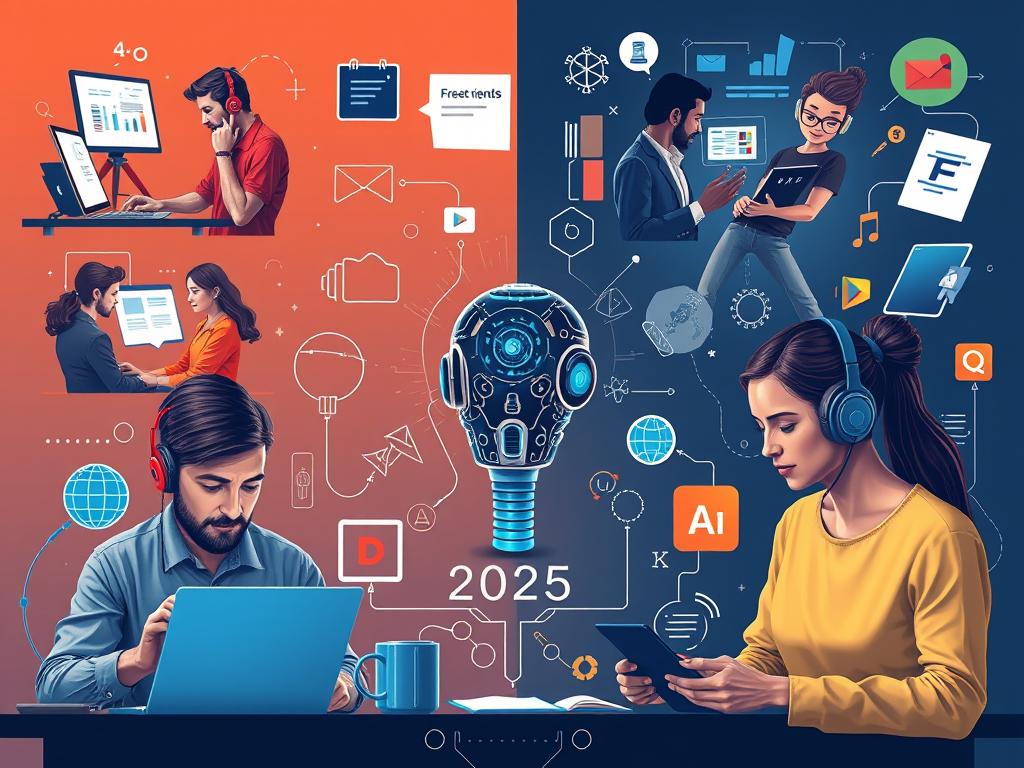
Opportunities and Challenges for Self-Employed Workers
Opportunities
- Ability to scale businesses without hiring additional staff
- Access to enterprise-level capabilities through affordable AI tools
- Increased productivity allowing for higher earnings or better work-life balance
- New niches emerging for AI implementation specialists serving other freelancers
Challenges
- Limited access to advanced AI training and education
- Digital divide creating disparities between tech-savvy and traditional freelancers
- Pressure to continuously adapt to rapidly evolving AI capabilities
- Difficulty differentiating human-created work from AI-generated content
Case Study: Creative Industries
Freelancers in creative fields are experiencing particularly dramatic changes due to AI:
- Writers using AI for research, outlining, and editing while focusing on original insights
- Graphic designers leveraging AI for initial concepts while adding human creativity for final designs
- Photographers using AI for image enhancement and batch processing
- Musicians incorporating AI-generated elements while maintaining artistic direction
The key to success for these professionals lies in their ability to use AI as a tool that amplifies their unique human creativity rather than replacing it. This approach allows them to increase productivity while maintaining the distinctive value that clients seek.
“The skills sought by employers are changing 66% faster in jobs ‘most exposed’ to AI, creating both challenges and opportunities for workers who must continuously adapt.”
PwC’s 2025 Global AI Jobs Barometer
For self-employed workers, AI is increasingly becoming a great equalizer, providing access to capabilities previously available only to large organisations. However, the digital literacy gap remains a significant challenge that must be addressed to ensure equitable access to these opportunities.
Preparing for an AI-Driven Future
As AI continues to reshape the job sector across all business sizes, workers and organisations must proactively prepare for a future where human-AI collaboration becomes the norm. This preparation requires strategic up skilling, educational initiatives, and policy considerations.

Essential Skills for the AI Era
Technical Skills
- Coding and programming fundamentals to customize AI applications
- Data analysis capabilities to interpret AI outputs and identify patterns
- AI model training and optimisation for specific business contexts
- Prompt engineering to effectively communicate with AI systems
- Cybersecurity awareness to protect AI systems from vulnerabilities
Complementary Human Skills
- Creative thinking that goes beyond algorithmic approaches
- Critical problem-solving for challenges AI cannot address
- Emotional intelligence for human-centered customer interactions
- Adaptability to continuously evolving technological landscapes
- Ethical judgment for responsible AI implementation
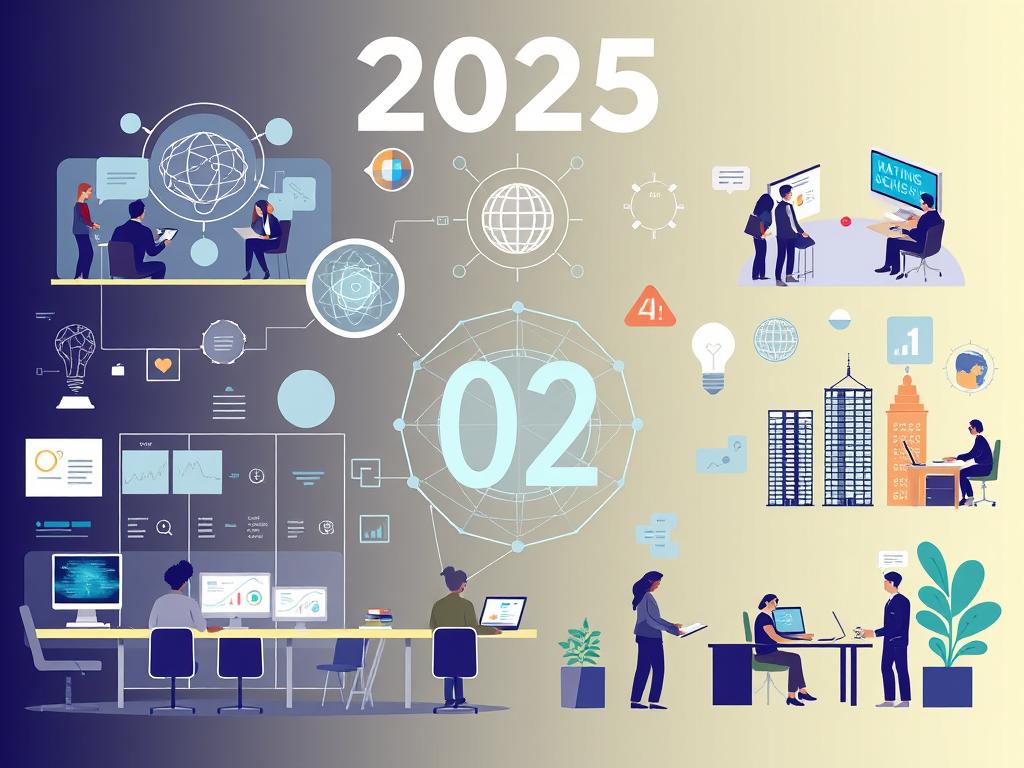
Education and Training Approaches
Large Enterprise Training
Large organisations are developing comprehensive internal AI training programs:
- Dedicated AI academies within corporate universities
- Mentorship programs pairing AI experts with employees
- Rotation programs exposing workers to various AI applications
- Certification pathways for specialized AI roles
SMB Learning Solutions
Smaller businesses are leveraging external resources for cost-effective learning:
- Online platforms like Coursera, Udemy, and LinkedIn Learning
- Industry association training programs and certifications
- Vendor-provided training for specific AI tools
- Collaborative learning communities sharing best practices
Self-Employed Upskilling
Independent workers are creating personalized learning paths:
- Self-directed learning through online tutorials and documentation
- Peer networks for knowledge sharing and support
- Project-based learning applying AI to real client work
- Specialised courses focused on freelancer-specific AI applications
Policy Implications and Career Strategies
Policy Considerations
Governments worldwide are developing strategies to address AI’s impact on employment:
- Public funding for AI education to reduce the 229 million global unemployment figure
- Public-private partnerships creating accessible AI training programs
- Regulatory frameworks ensuring ethical AI implementation
- Safety nets for workers displaced by automation
- Tax incentives for businesses investing in worker up-skilling
Individual Career Strategies
Workers can take proactive steps to thrive in an AI-augmented job market:
- Continuous learning through formal education and self-directed study
- Building portfolios demonstrating both AI and human skills
- Networking on platforms like LinkedIn to explore AI-driven opportunities
- Developing niche expertise that complements AI capabilities
- Cultivating adaptability as a core professional competency
“Workers with AI skills command a 56% wage premium: up from 25% last year. The value that AI-powered workers bring is apparent in every industry we analyzed.”
McKinsey’s Superagency in the Workplace Report
The key to thriving in an AI-driven job market lies in proactive upskilling and the development of adaptability as a core competency. By embracing AI as a collaborative tool rather than a replacement, workers across all business sizes can position themselves for success in the evolving landscape.
Future-Proof Your Career in the AI Era
Get personalized guidance on how to prepare your business and workforce for AI transformation.
Conclusion: Navigating the AI-Transformed Job Sector
AI is fundamentally reshaping the job sector in 2025, with 81% of AI buildout concentrated in large enterprises and government, while 44% of the $5.3 trillion tech industry is driven by SMBs. This dual dynamic creates a complex landscape of opportunities and challenges across the workforce spectrum.
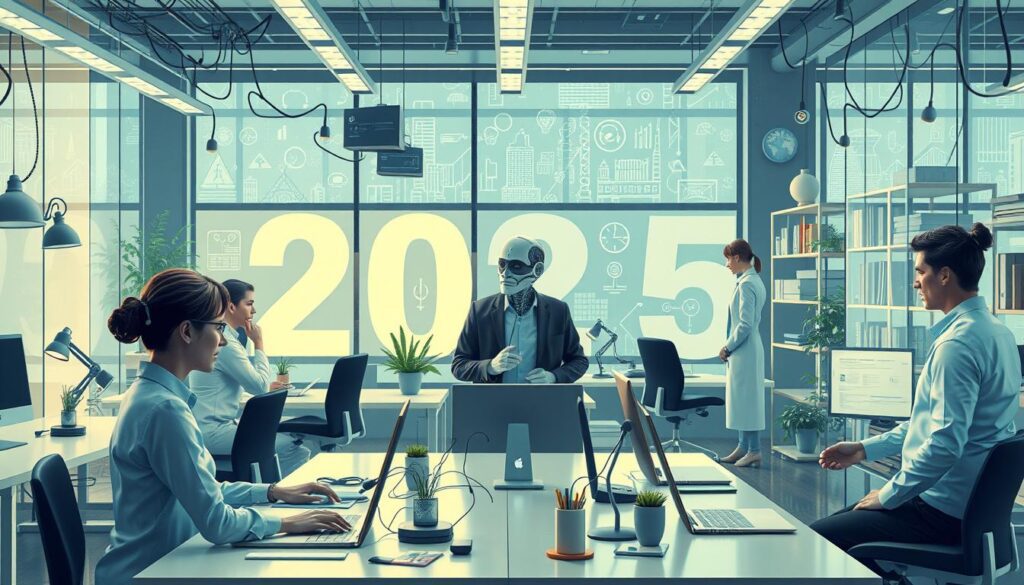
From self-employed workers leveraging affordable AI tools to large organizations implementing comprehensive AI strategies, the technology is creating new possibilities while transforming existing roles. The data clearly shows that AI is not simply eliminating jobs but rather reshaping them often creating more value and higher wages for workers who can effectively collaborate with these systems.
To navigate this transformation successfully, workers and organisations must embrace AI tools, up skill in both technical and complementary human capabilities, and develop the adaptability needed to thrive in a rapidly evolving landscape. Those who view AI as a collaborative partner rather than a threat will be best positioned to capture the opportunities of this new era.
The future of work is not about humans versus machines but rather humans and machines working together to achieve outcomes neither could accomplish alone. By understanding AI’s impact across different business sizes and sectors, we can prepare for a future that harnesses technology’s potential while preserving the uniquely human contributions that remain irreplaceable.
Transform Your Business with AI Strategy
Discover how AI can specifically impact and transform your business operations, workforce, and competitive positioning.
Want to hire me as a Consultant? Head to Channel as a Service and book a meeting.

